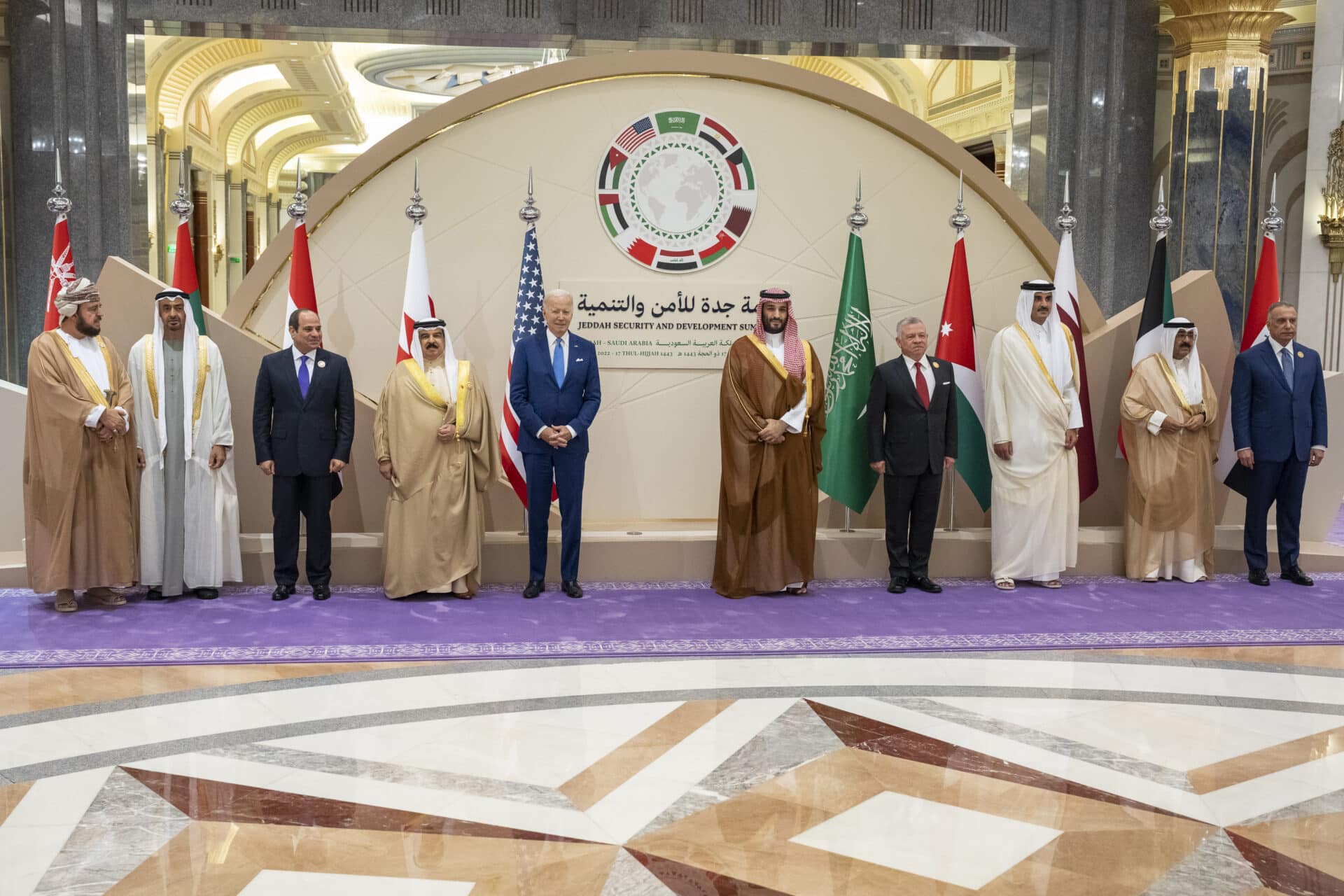Examining Trump's "Bromances": His Relationships With Middle Eastern Leaders

Table of Contents
The Trump-MBS Relationship: A Complex Dynamic
The relationship between Donald Trump and Mohammed bin Salman (MBS) was undoubtedly one of the most significant and controversial aspects of Trump's Middle Eastern policy. Characterized by high-level arms deals and significant economic ties, the relationship also faced intense scrutiny due to concerns over human rights abuses in Saudi Arabia. The sheer volume of arms sales to Saudi Arabia during Trump's tenure was unprecedented, fueling debates about the ethical implications of such transactions. Simultaneously, Saudi Arabia made substantial investments in US businesses, further solidifying the economic interdependence.
- Major arms sales to Saudi Arabia: These included billions of dollars worth of advanced weaponry, significantly bolstering Saudi Arabia's military capabilities.
- Investments by Saudi Arabia in US businesses: These investments impacted various sectors, strengthening economic ties between the two nations.
- Criticism of Saudi Arabia's human rights record: The assassination of Jamal Khashoggi cast a long shadow over the relationship, triggering international condemnation.
- Trump's defense of MBS: Despite widespread criticism, Trump consistently defended MBS, highlighting the strategic importance of the relationship to US interests.
The complex nature of this relationship underscores the challenges in disentangling personal chemistry from geopolitical strategy. While images of apparent camaraderie existed, the underlying strategic and economic interests were undeniable, creating a dynamic that continues to be debated and analyzed.
Trump and Netanyahu: A Shared Vision for the Middle East?
Donald Trump's relationship with Benjamin Netanyahu, then-Prime Minister of Israel, was equally profound and impactful. Their shared skepticism towards the Iran nuclear deal and their aligned views on several regional issues formed the bedrock of their close collaboration. One of the most significant events during this period was the relocation of the US embassy to Jerusalem, a move that solidified US support for Israel's claim to the city and dramatically shifted the geopolitical landscape.
- Recognition of Jerusalem as Israel's capital: This controversial decision was widely celebrated in Israel but condemned by many in the Palestinian territories and the international community.
- Withdrawal from the Iran nuclear deal: This move, supported by Netanyahu, significantly altered the dynamics of the Iranian nuclear program and regional security.
- Brokering of normalization agreements (Abraham Accords): Trump played a crucial role in brokering the Abraham Accords, normalizing relations between Israel and several Arab nations, a significant diplomatic achievement.
- Shared views on Iran: Both leaders viewed Iran as a major threat to regional stability, shaping their joint strategy towards the country.
This close relationship demonstrated a clear alignment of strategic interests, but the extent to which personal chemistry contributed remains a matter of interpretation. The consequences of their collaboration continue to resonate throughout the Middle East.
Other Key Relationships and Broader Implications
Trump's interactions extended beyond MBS and Netanyahu. He cultivated relationships with other significant Middle Eastern leaders, including Egyptian President Abdel Fattah el-Sisi. While these relationships varied in depth, they all contributed to the overall shift in US foreign policy under Trump's leadership. His approach, often characterized by a transactional and less interventionist stance, resulted in significant changes to alliances and regional dynamics.
- Examples of interactions with other leaders: These interactions often involved bilateral meetings, phone calls, and joint statements focusing on security and economic cooperation.
- Impact on regional conflicts: Trump’s policies influenced ongoing conflicts, such as the Syrian civil war and the Yemen conflict, often through reduced US involvement.
- Changes in US alliances in the Middle East: The emphasis on transactional relationships led to shifts in traditional alliances and partnerships.
- Long-term effects on US foreign policy: Trump’s approach left a lasting impact on US foreign policy, influencing subsequent administrations’ strategies in the region.
Analyzing the "Bromance" Narrative: Fact or Fiction?
The term "bromance," while catchy and widely used, requires critical examination. While there were clear instances of public displays of friendship between Trump and several Middle Eastern leaders, this should not overshadow the underlying strategic and economic considerations driving these relationships. The evidence suggests a complex interplay of personal rapport and strategic interests, making it difficult to definitively label these relationships as purely personal or purely transactional.
- Examples of public displays of friendship: These included photographs, joint statements, and informal interactions highlighting apparent camaraderie.
- Evidence of strategic considerations driving the relationships: The significant arms deals, economic agreements, and policy decisions point clearly to strategic factors influencing these interactions.
- Analysis of public statements and actions: Careful examination of official pronouncements and actions reveals the motivations behind these relationships.
- Expert opinions on the nature of these relationships: Foreign policy experts offer varied perspectives, highlighting the complexities involved.
Conclusion: Understanding Trump's Legacy in the Middle East
Trump's relationships with Middle Eastern leaders were characterized by a unique blend of personal chemistry and strategic calculations. While some viewed his approach as pragmatic and effective in achieving specific goals, others criticized his prioritization of transactional relationships over long-term strategic partnerships and human rights considerations. Understanding the full impact of these "bromances" requires a nuanced examination of the events, motivations, and consequences involved. Further research and ongoing discussion are crucial to comprehending their lasting effects on US foreign policy in the Middle East. We encourage you to delve deeper into this multifaceted topic by exploring academic articles, news reports, and policy analyses on Trump's Middle Eastern diplomacy and the implications of his “bromances.” Continue the conversation – what are your thoughts on the lasting legacy of Trump's relationships with Middle Eastern leaders?

Featured Posts
-
 X Advertisers Respond To Elon Musks Boycott Accusations
May 17, 2025
X Advertisers Respond To Elon Musks Boycott Accusations
May 17, 2025 -
 Fortnites New Icon Series Skin Revealed Everything We Know
May 17, 2025
Fortnites New Icon Series Skin Revealed Everything We Know
May 17, 2025 -
 Andor Season 1 Episodes Where To Watch Before Season 2 Premieres
May 17, 2025
Andor Season 1 Episodes Where To Watch Before Season 2 Premieres
May 17, 2025 -
 Birlesik Arap Emirlikleri Ve Tuerkiye Erdogan In Telefon Goeruesmesinin Ardindan
May 17, 2025
Birlesik Arap Emirlikleri Ve Tuerkiye Erdogan In Telefon Goeruesmesinin Ardindan
May 17, 2025 -
 Foodpanda Taiwan Acquisition Uber Cites Regulatory Challenges
May 17, 2025
Foodpanda Taiwan Acquisition Uber Cites Regulatory Challenges
May 17, 2025
